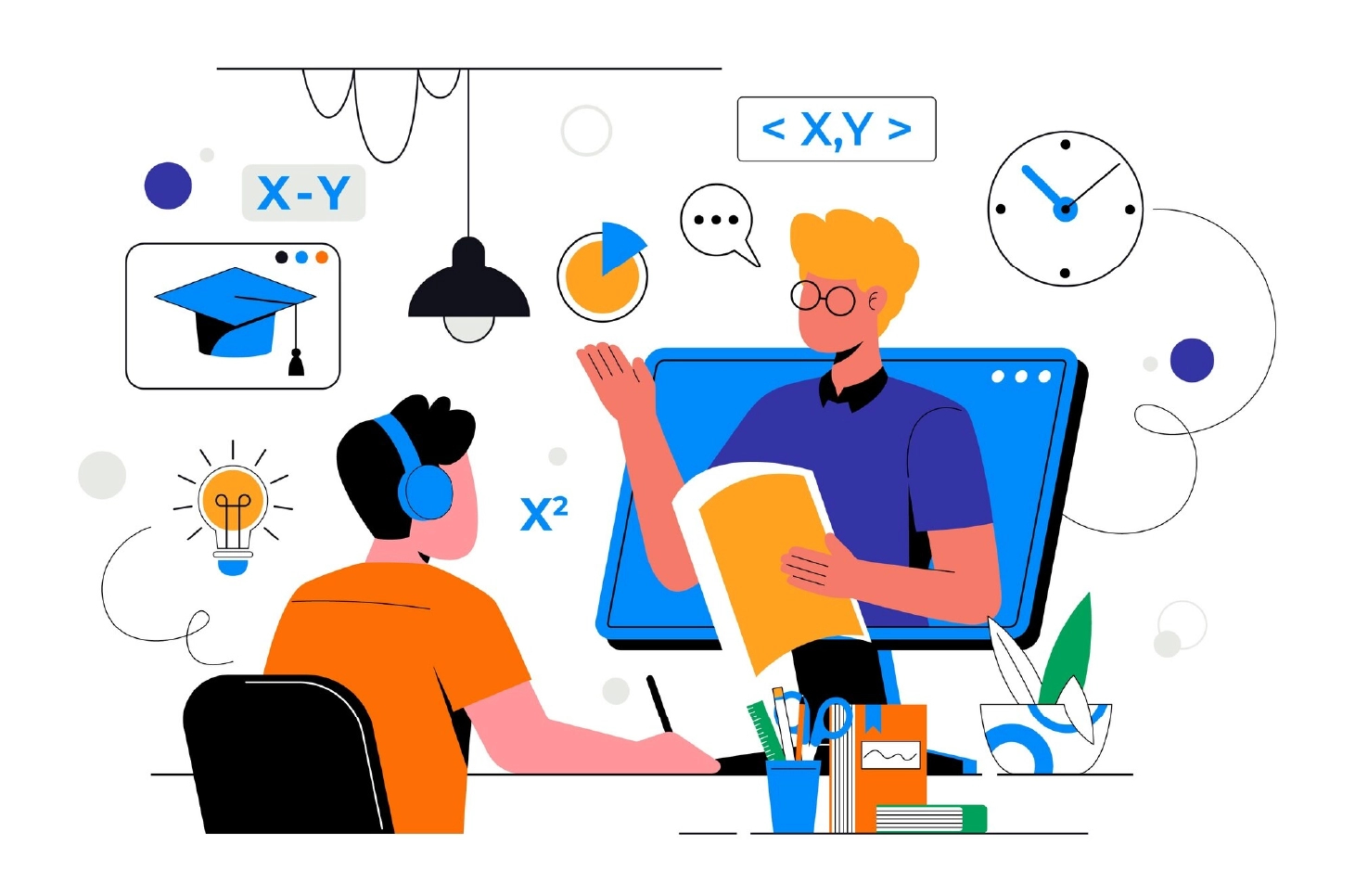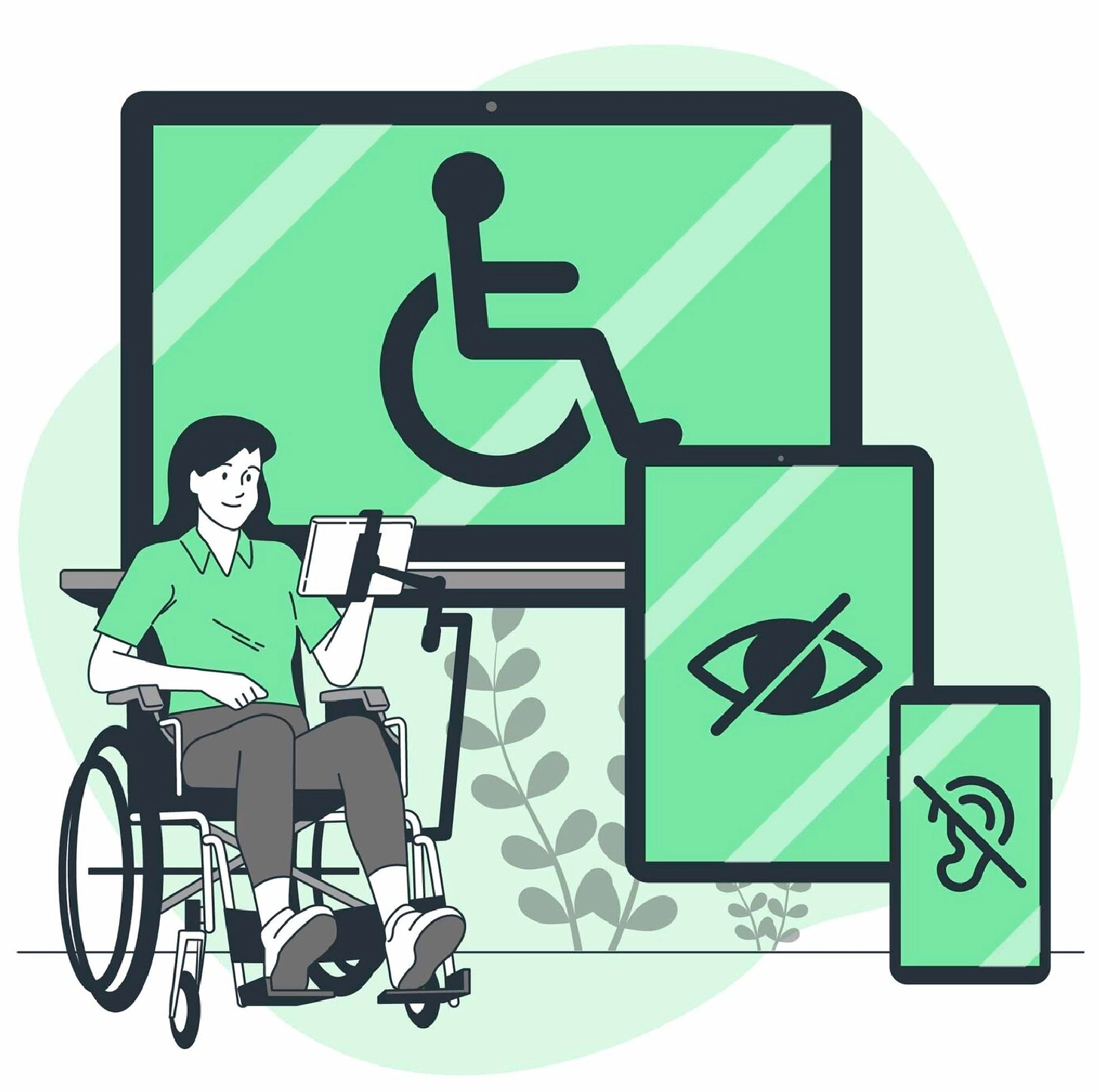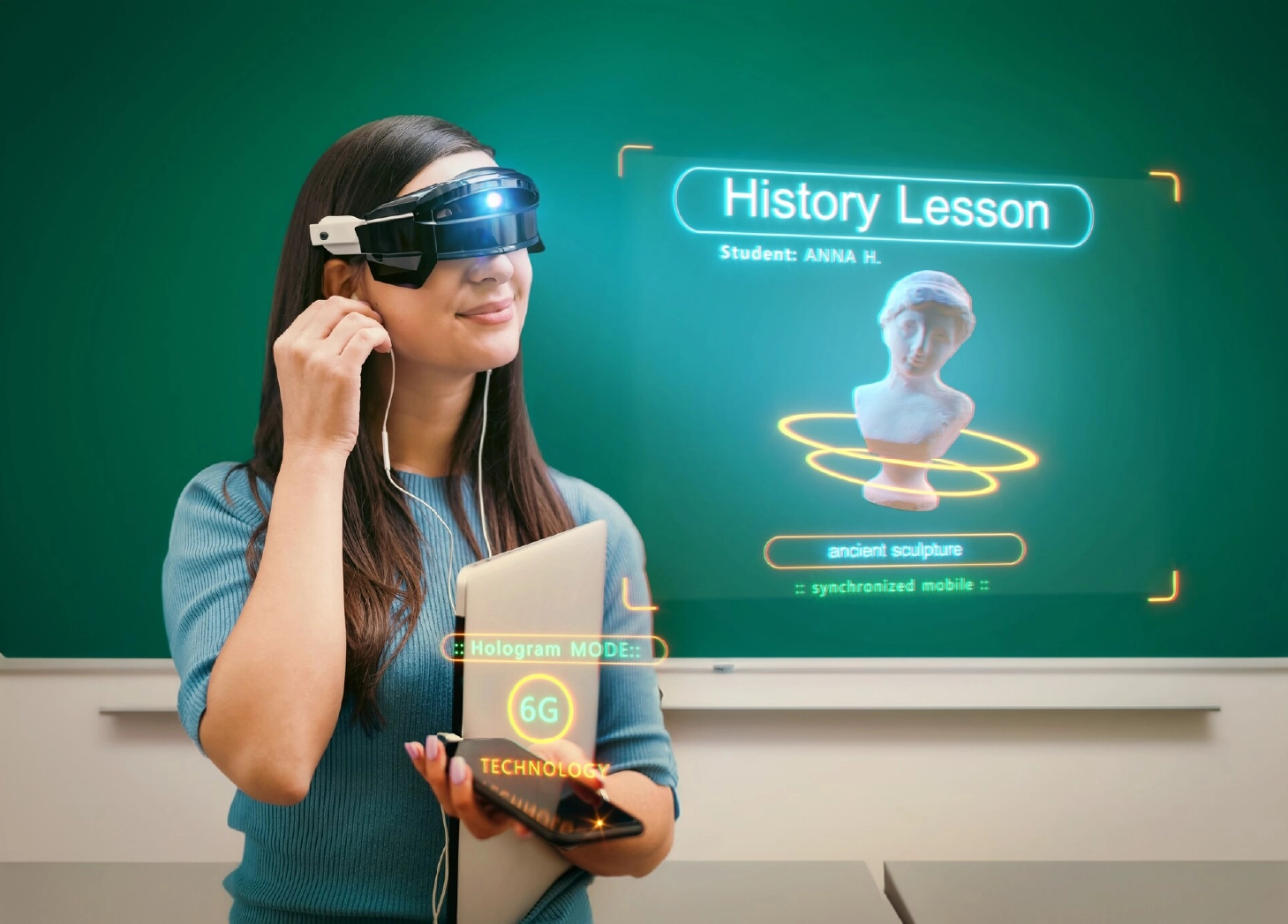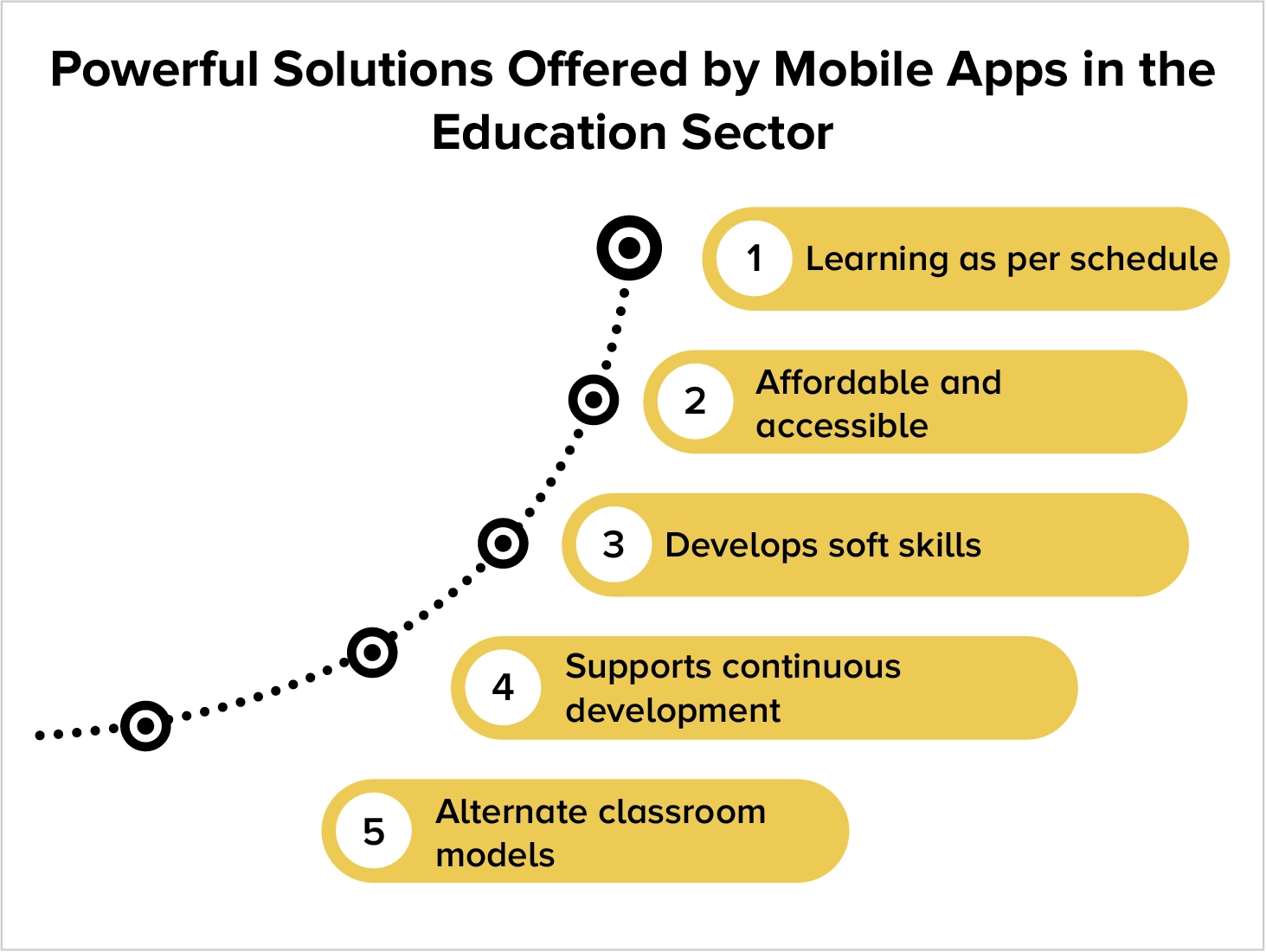- Evolution of Education from Textbooks to Tech
- Understanding the Benefits and Role of Mobile Apps in Education
- Powerful Solutions Offered by Mobile Apps in the Education Sector
- Challenges and Considerations Associated with the Use of Mobile Apps in Education
- Trends and Innovation in Education Through Mobile Apps | Beyond 2024
- Key Takeaway

Schools and institutions across the globe have shifted to e-learning. The dominance of online education has transformed traditional educational paradigms, offering an interactive experience for all. Top education apps are increasingly being used to supplement classroom teaching and innovate learning.
Study apps bring teachers and learners a world of information, resources, and opportunities. Our blog will uncover the different ways in which mobile apps are facilitating educational breakthroughs. We will also explore the vast expanse of mobile app adoption in education, highlighting its impact, challenges, and the infinite possibilities it holds.
Evolution of Education from Textbooks to Tech
The success and rapid adoption of mobile apps for education can be attributed to their convenience, flexibility, and accessibility. These apps can personalize the learning experience for all users, offering knowledge at their desired pace. The use of mobile apps in education allows learners to expand their learning beyond classrooms.
Educational apps have gone from being niche to a necessity over the past few years. US consumers are spending over $1 billion on education apps. This number has accelerated since the pandemic and will continue to grow further.
There are multiple benefits of mobile apps in education. Mobile apps not only enhance the effectiveness of classroom teaching but also add an element of fun to the classroom. The top apps for education, available for Android and iOS users, include the following.
- Duolingo
- BYJUs
- Google Classroom
- Brainly
- ABCmouse
- Udemy
- Chegg
Understanding the Benefits and Role of Mobile Apps in Education
Mobile apps play a pivotal role in shaping the educational sector. These apps not only offer easy access to information but also simplify learning. Mobile apps fundamentally transform how knowledge is accessed and consumed by all learners.
Let’s discuss the role of mobile apps in education in detail.
1. Personalized learning

Mobile apps deliver tailored information and educational content that adapts to each student's unique learning pace and style. With adaptive learning technologies supported by AI in education, apps can measure a learner's ability in real-time. These can further alter the difficulty level of activities accordingly, resulting in optimal learning progress.
2. Enhanced accessibility

The accessibility offered by mobile apps ensures that education is not limited to traditional classrooms. Learners can access educational content from anywhere and anytime, overcoming geographical and time barriers. This has been especially important in making education more inclusive for students from distant locations or with physical disabilities.
3. Interactive learning experience

Mobile apps enhance learning by using gamification, interactive quizzes, and virtual simulations. These interactive components not only boost students' motivation but also aid in deeper understanding and retention of content. Additionally, the Doctrine AI review highlights how such technologies can transform educational experiences through personalized learning paths.
4. Fosters collaboration and communication

One of the key educational advantages of mobile applications is streamlined communication. Mobile apps foster student collaboration and enable effortless student and teacher communication. Platforms that support group projects, conversations, and immediate feedback promote a collaborative learning environment that encourages peer learning and support.
5. Instant access to information
The wide variety of resources available through educational apps gives students rapid access to information that is not available in textbooks. These apps are packed with all the essential information, from online libraries and educational movies to interactive encyclopedias. This variety of resources encourages study, inquiry-based learning, and ongoing self-improvement.
6. Quick progress and performance tracking

Educational apps often offer reporting and analytics tools, allowing students and teachers to track progress and identify areas for growth. This data can be used to develop tailored learning plans and interventions that help students reach their maximum potential.
7. Headset for the future
Students who include technology in their learning processes not only gain knowledge in certain subject areas but also develop essential digital literacy skills. Students who are skilled at using digital tools and researching online resources are more prepared to meet the demands of the modern workforce.
8. Multimedia content

Education app development companies focus on offering a wide variety of multimedia content for all learners. The apps are packed with educational audio, videos, and images to improve the overall learning experience. The integration of multimedia elements allows learners to grasp things faster. Additionally, this approach promotes a holistic understanding of the subject matter.
9. Supplementary learning
Learning apps are often designed to complement traditional classroom teaching methods. These apps offer supplementary material and additional resources to enhance learning. Education apps are extremely useful for additional practice and revision.
10. Academic excellence
One of the primary benefits of mobile apps in education is their ability to support academic excellence. Services like pay for essay platforms can be instrumental for students seeking to maintain high academic standards while managing their time efficiently. When used responsibly, these services can provide high-quality content creation, personalized learning resources, and an effective way to manage schedules.
Design and create user-centric apps- partner with top mobile app development companies
Powerful Solutions Offered by Mobile Apps in the Education Sector
The use of mobile apps in education unlocks new possibilities for teaching and learning. Learning apps have modernized the age-old methods of learning, making it more accessible and fun. Let’s have a look at some of the most impactful solutions and understand the importance of mobile apps in education.

1. Scheduled learning
Scheduled learning can help you maximize your time. With the help of the best mobile learning apps, you can fix a schedule and get reminded of the preparation accordingly.
You can set reminders, track previous chapters you learned with notes, figure out what you have to learn about, and more. One of the top importance of educational apps is to ensure that your study doesn’t get off track. It will help you optimize your performance.
2. Affordable Learning
As everyone can not afford to buy heavy books or hire expensive tutors to prepare for exams, education-related apps can play a vital role in helping those students. Free of cost or cheap educational content can make it accessible to a larger group of students. Therefore, it will indirectly help in the development of society as well.
3. Digital literacy and skills development
Incorporating technology into education at a young age helps children build important digital literacy skills. Students who can navigate digital platforms and grasp digital information are better prepared for the demands of today's job market.
4. Continuous development
For professionals, mobile apps provide chances for ongoing education and skill improvement. Individuals can enhance their professions and remain competitive in the job market by taking advantage of online courses, workshops, and certifications available.
5. Flipped classroom models
Mobile apps enable a flipped classroom approach, where students can research new topics at home via videos or reading materials and then use classroom time for discussions and hands-on exercises. This model encourages active learning and better utilizes classroom interactions.
Challenges and Considerations Associated with the Use of Mobile Apps in Education
It is quite evident that there are multiple benefits of mobile apps in education. However, integrating mobile apps into education comes with its own set of challenges and considerations. Some of these challenges are listed below.
- Not all students and learners have equitable access to technology. Mobile apps and the internet cannot be accessed by all, limiting their learning opportunities.
- Managing digital distractions while studying online can be challenging for both students and teachers.
- Maintaining the privacy and security of users online can be a daunting task. Online learning apps often collect personal information that can be misused.
- There is a learning curve associated with online learning apps. Educators require proper training, and students need guidance on how to use the apps.
- Educational apps must align with the curriculum standards. Additionally, these apps offer interactive learning experiences to maximize their effectiveness.
Trends and Innovation in Education Through Mobile Apps | Beyond 2024
The industry has radically shifted and transformed with the rise of educational mobile app development. Learning apps open up new possibilities for involvement and customization.
Curious about how to build mobile apps that can facilitate learning and innovation? Let’s discuss some key trends to look out for in this sector.
1. Gamification and micro-learning
Gamification aspects and microlearning modules will remain key trends in educational apps. Using gamification in educational apps enhances engagement and retention by breaking down knowledge into small, manageable portions and making learning more game-like and rewarding. Educational games can be helpful for teaching basic concepts to young kids.
2. AI-driven personalized learning
The integration of Artificial Intelligence (AI) in mobile apps will continue to grow. This will provide individualized learning experiences tailored to learners' specific needs and pace. AI can adjust content, make smart recommendations, and even predict learner requirements to improve engagement and outcomes.
3. Advanced use of AR and VR technologies
Augmented Reality (AR) and Virtual Reality (VR) technologies will gain prominence in education, enabling immersive and interactive learning environments. These technologies can recreate realistic settings, making complex subjects more approachable and interesting.
4. Blockchain for security
Blockchain technology will be critical in assuring educational content security and credential verification. It provides a decentralized approach to storing and managing credentials, making the certification process more transparent and tamper-proof.
5. Adaptive learning technologies
Adaptive learning technologies that modify the complexity of content based on the learner's performance will become more popular. These technologies ensure that learners are continually pushed but not overwhelmed, resulting in improved learning results.
6. Integration with wearable technologies
Integrating mobile apps with wearables enables new ways to learn and interact with content. For example, smartwatches can be used to learn languages, and VR headsets can be used to explore historical events.
Key Takeaway
The use of mobile apps in education marks a fundamental shift in how learners access, interact with, and learn new information. These tools blend accessibility, personalization, and interactivity that was previously unimaginable. As education continues to evolve, mobile apps spring up as essential tools for addressing different learning needs and styles.
Learning apps can overcome geographical and financial barriers to education and prepare students for a future in which technology and learning are intrinsically interwoven. The benefits of mobile apps in education are plenty and the potential for them is limitless, providing a platform for ongoing innovation and improvement in how we connect and interact with the huge world of knowledge.
Frequently Asked Questions
-
How are mobile apps transforming the educational landscape?
-
How do mobile apps contribute to making education more accessible?
-
How do mobile apps enhance learning experiences for students?
-
What makes mobile apps an important tool in education?
-
What roles do mobile apps play in personalized learning?
-
What specific benefits do mobile apps offer in education?





